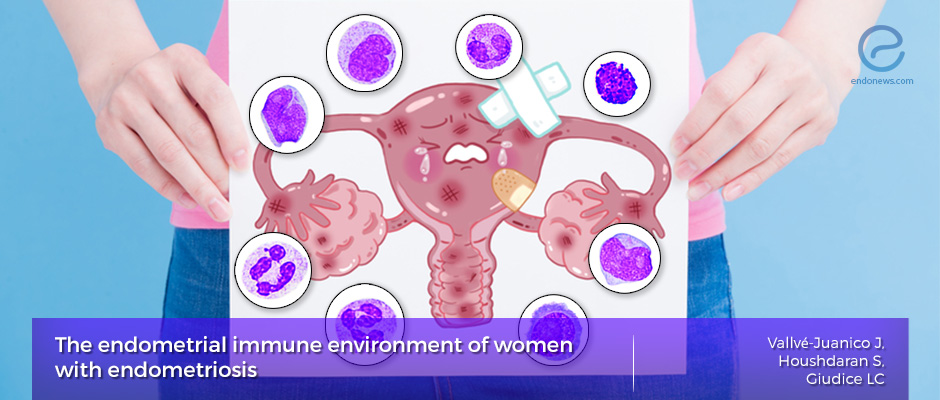Immune environment of endometriosis
Nov 25, 2019
Immune response matters
Key Points
Highlight:
- The immune cells have important functions in healthy endometrium, with concerted changes to facilitate a woman’s menstrual cycle and pregnancy.
- Understanding the immune niche in women with endometriosis may be useful for developing new diagnostics and therapeutics tools.
Importance:
- From decades of research, it is believed that the immune system has a central role in the pathophysiology of endometriosis.
- However, a concrete picture of immunity associated with endometriosis is still blurry.
What's done here:
- The objective of this review article was to determine consistent findings of immune cell populations, functionality and activation states in women with and without endometriosis.
- The key search terms included endometriosis, inflammation, human eutopic/ectopic endometrium, immune cells, immune population, immune system, macrophages, dendritic cells (DC), natural killer cells, mast cells, eosinophils, neutrophils, B cells, and T cells.
- The databases used were PubMed, Medline, and Google Scholar.
Data:
- Endometriosis is associated with alterations of macrophages, immature dendritic cells, and regulatory T cells.
- These immune cell types behave different in endometriosis as compared to healthy endometrium.
- A pro-inflammatory M1 macrophage phenotype is predominant in endometriosis, rather than the anti-inflammatory M2 macrophage.
- The behavior of natural killer cells is abnormal in the endometrium of women with endometriosis.
Limitation:
- It is suggested that the conflicting data regarding immune cells in endometriosis from previous studies may be due to small study size, variable hormonal milieu, and variable experimental approaches and technologies.
Lay Summary
The results from the past decade of research have shown that an altered pro-inflammatory immune environment in endometriosis is believed to contribute to the pathophysiology of the disease. Because of changes in the immune microenvironment in the disease state, the reproductive function of the endometrium is also compromised.
The menstrual cycle has several phases, which include the proliferative, secretory, menstrual and regenerative phases. Despite changes of immune cells in endometriosis, it is important to note that the immune environment of the endometrium is not at steady state, but is also dynamic in healthy individuals to accommodate for menstrual cycles and the reproductive capability of a woman. For a successful pregnancy, the endometrium immune system also has to establish tolerance of the fetus. Thus, immune cell populations and functions do change over time, making it difficult to pinpoint what is abnormal in a disease setting.
The current article published in Human Reproduction Update by Guidice et al. from the Department of Obstetrics, Gynecology and Reproductive Sciences, University of California, San Francisco, CA has reviewed immune abnormalities that are associated with endometriosis. It examined the immune cells populations, activation states, and variations across endometrium from healthy women and women with endometriosis. The authors conducted a literature search from 1982 to 2018 that concur with the review’s goal.
In general, it was found that the immune niche in women with endometriosis is largely compromised. In healthy conditions, the macrophages are crucial for the clearing of cell debris during menses, tissue regeneration, and angiogenesis. Macrophages can be broadly classified into two states, in which M1 is the pro-inflammatory type and M2, the anti-inflammatory type. Endometriosis is mainly associated with M1 macrophages, while the M2 predominate the normal endometrium. This M1 and pro-inflammatory characteristics of endometriosis affect reproductive function such as embryo implantation. In addition, during the secretory phase of the menstrual cycle, the population of macrophages and dendritic cells do not increase during endometriosis, leading to the insufficient removal of cell debris, which can develop into ectopic lesions. There are also dysregulation of the regulatory T cells (Treg) and natural killer cells in endometriosis. Overall, these changes promote a pro-inflammatory environment which then compromised the normal function of the uterus.
To improve future research, the opportunity to study robust and well-defined cohorts will be crucial. The advancement in technologies to profile and phenotype the immune cells will be increasingly useful. Future research should examine specific immune cell activation and endometrial immune cell markers. Further understanding of the immune populations in the endometrium should lead to the development of less invasive diagnostics and novel immunomodulators for the disease.
Research Source: https://www.ncbi.nlm.nih.gov/pubmed/31424502
immune system inflammation

